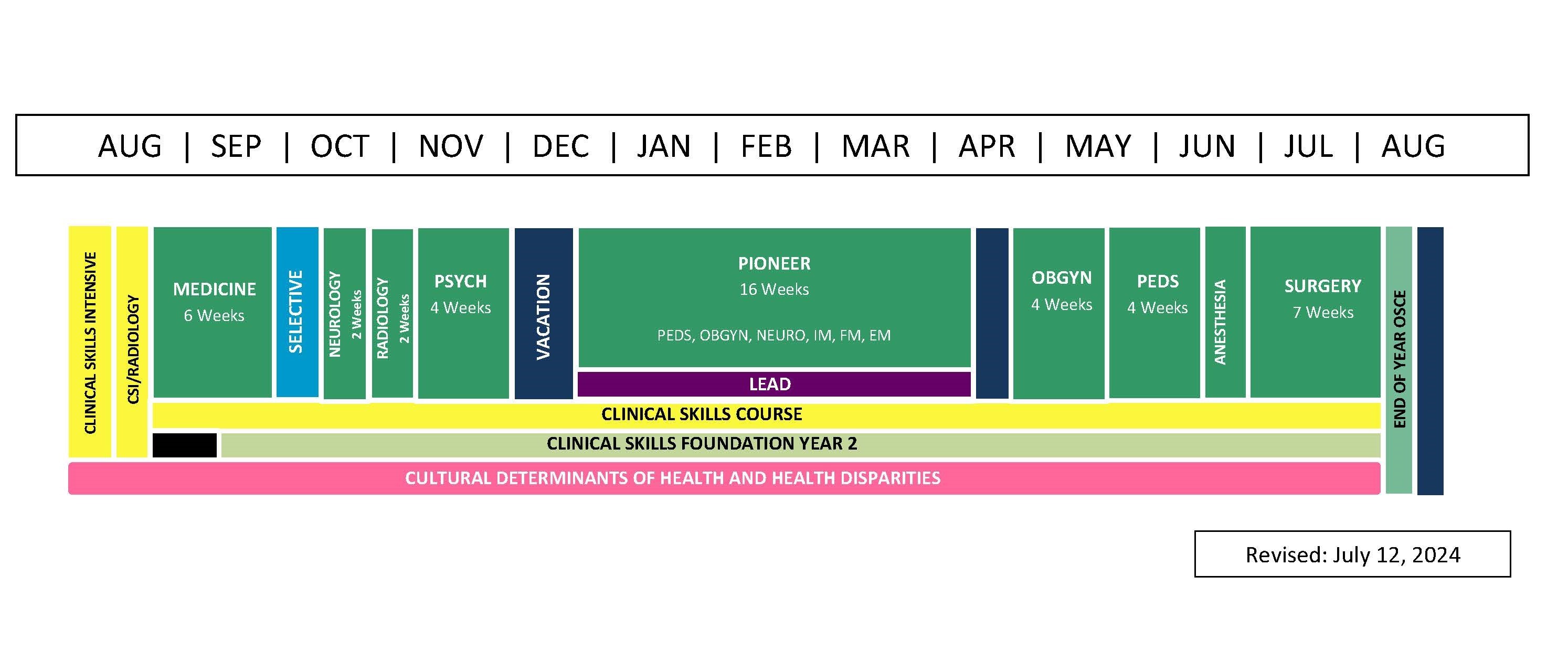Students serve as the primary provider for their patients, working in interprofessional teams to obtain histories, perform physical exams, and develop and implement diagnostic plans. They apply the foundational training received from the first year to incorporate biomedical principles, social context of medicine, and leadership skills to serve patients and families.
Clerkship & Courses
Students learn clinical medicine through a clinical skills intensive course, block clerkship rotations in inpatient settings, longitudinal clinics in outpatient settings, and longitudinal clinical small group courses.
Students start their clerkship year with a three-week clinical skills intensive to launch them into their clerkships. The course includes dedicated radiology training, orientation to the clinical settings, symptom-based approach to various clinical problems, hands-on procedure practice, orientation to each clerkship, documentation in electronic health records practice, interpreter use training, and other core skills to prepare students for their clinical year.
- Medicine (6 weeks)
- Surgery (7 weeks)
- Obstetrics and Gynecology (4 weeks)
- Pediatrics (4 weeks)
- Psychiatry (4 weeks)
- Neurology (2 weeks)
- Radiology (2 weeks)
- Anesthesia (1 week)
PIONEER is a 16-week course in which students attend a longitudinal clinic in each of the following specialties once a week:
- Internal Medicine
- Neurology
- Obstetrics and Gynecology
- Pediatrics
Students will also participate in the following:
- Emergency Medicine shifts
- Discovery – one half-day a week for individualized education
- Trailblazing – one half-day a week for interactive workshops to train students to be leaders and innovators in humanistic care
Students will also concurrently complete a 16-week longitudinal Family Medicine clerkship with weekly family medicine clinics.
- Clinical Skills Course (CSC) teaches essential clinical skills in the practice of medicine. The course meets in small groups for applied practice working through cases and applying clinical reasoning. The course kicks off with a three-week “Clinical Skills Intensive” at the start of the second year which builds on the foundational sciences in the first year to prepare students for their clinical rotations.
- Clinical Skills Foundation 2 (CSF2) continues to work in all aspects of the physician-patient relationship. Working together in the same small groups from Year 1, students will reflect on their experiences on the clinical rotations and apply topics such as ethics, spirituality, pain management, high value care, and end-of-life care. Students develop skills in advanced patient communication techniques.
- Cultural Determinants of Health & Health Disparities (CDHD) takes a deeper reflective dive into the topics covered in year 1's Social and Structural Drivers of Health (SSDH) while immersed in the clinical environment. This course uses reflective writing, lectures, and small group discussion to meet course goals.
- Selectives - Students choose two one-week selectives in the second year that provide an opportunity before the fourth year for students to learn about clinical subspecialties not directly covered by clerkships and to support career exploration. There are approximately 30 selectives from which to choose.
MS2 Curriculum Schedule
All students begin their clinical training by participating in the 16-week PIONEER experience which launched in August 2023 and includes longitudinal ambulatory clinical experiences.

Transportation Expectations
Students must have access to reliable transportation, such as personal vehicles, to travel to clinical training sites located off main campus. With limited public transportation options in Durham, if you do not have a personal vehicle, you should be prepared to rely on alternate modes of transport such as Uber/Lyft or other personally-sourced modes of transportation. Please note that training at clinical sites in the community is a fundamental part of our curriculum in preparing you to care for patients and families. If you have questions regarding financial aid for transportation costs, please contact Lori Crooks, Assistant Dean, Financial Aid and Registrar at lori.crooks@duke.edu.